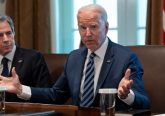For outside observers, gun control seems to be an oxymoron in America. Even following the school shooting in Newtown, the Senate failed to pass an amendment mandating universal background checks on sales of firearms. President Obama reacted with visible anger. He had staked much of his post-election political capital on ‘gun sense’, only to have a watered-down bipartisan bill proposed by two pro-gun Senators muster just 54 votes in the Senate. Polling revealed that the bill had more than 80% support amongst Democrats, Republicans and independent Americans.
The formal American system is famously anti-majoritarian: it is a cluster of staggered, disjointed and (in the case of the Supreme Court) even mythical legitimacies, all of which exercise influence over federal legislation. But questions remain as to why America cannot pass stricter gun laws, when a majority of Americans support a number of increased restrictions.
It would seem that the root of this particular anti-majoritarian outcome is more electorally related than systemic. As the President argued following the bill’s failure:
It came down to politics. They [the Senators who voted against the amendment] worried that a vocal minority of gun-owners would come after them in future elections. They worried that the gun lobby would spend a lot of money and paint them as anti-Second Amendment.
At the core of this thesis is the issue of salience. If swing or dormant voters base their electoral choices on gun issues, vulnerable elected officials must follow their preferences to get re-elected. Interest groups affect this dynamic. Whether by lobbying in person or mobilising voters, they inform politicians about salience and positions in the electorate, and the electorate about salience and positions of politicians.[1] This characterisation makes groups like the National Rifle Association (NRA) seem rather replaceable, or even benign, as pluralist transmitters of information that should aid democracy.
But in terms of gun control, at least, this is not the case. This is because aspects of group funding and internal structure are more relevant, complicating the simple picture of groups as transmitters. This creates a puzzle for academics: the ambiguity about whether donations are rewards or incentives – as well as the sheer multitude of factors that affect politicians’ decisions – has led to inconclusive evidence about the influence of money in debates like this.
States provide better answers
Examining the federal level is standard fare in American politics; but shifting our focus to the state level, where campaign finance is smaller – except when state races take on national significance – provides a natural context to understand the role of groups without the distorting influence of money. Over two weeks in September – between the Washington Navy Yard shooting and the federal government shutdown – I interviewed four Virginia State Senators and three key members of Virginia-based ‘gun rights’ and ‘gun sense’ groups, and found broad support for Obama’s explanation. Gun rights groups have been advancing in Virginia since 1993, to the extent that a leader of one group exclaimed: “In Virginia there’s not a whole lot to do!”
With the Virginia House of Delegates firmly in the hands of Republicans, the arena of competition is the State Senate, where there is an even partisan split [Note: the recent election of Lieutenant Governor Ralph Northam now puts the Democrats in control]. Gun rights groups claim a slim majority for their position in the Senate, given the two or three Democratic Senators representing rural districts who often vote against gun control – although there are also Republican Senators from urban districts who tend to waver. Still, both legislators and group leaders agreed that the influence of the NRA and other gun groups stemmed from their credible threat of mobilising essentially single-issue voters for or against a candidate. With a passionate membership, as a group leader put it: “I can do a ZIP code sort, and I can find out the ZIP codes of a particular House district, and I can say I’ve got these many numbers in your district.” The same cannot be said for ‘gun sense’ groups, who have no membership: “They’re a nuisance, but they’re not a factor.” The key point is that vulnerable legislators realise the one-sided nature of this bargain. They can appease a vote bank of gun-owners without losing the support of those who favour gun control. In the end they tend to fall in line.
These interviews give prima facie support for Obama’s proposed remedy: that “those who care deeply about preventing more and more gun violence will have to be as passionate and as organised and as vocal as those who blocked these common-sense steps.” Instead of believing that the influence of the NRA comes from buying off politicians, and throwing money at the problem, ‘gun sense’ groups would be wise to reconsider their strategies. At recall elections this September, two of the foremost proponents of ‘gun sense’ in Colorado – the state of the Columbine and Aurora shootings – were unseated, despite a huge funding lead bestowed by New York Mayor Michael Bloomberg and others. Until groups can boost the salience of gun control to swing and dormant voters, and communicate this salience to politicians, little will change. Until then, the recent moves by ‘gun sense’ groups remain unpromising, even in the wake of ongoing gun tragedy.
[1] Goldstein, K.M. (1999). Interest groups, lobbying, and participation in America. Cambridge: Cambridge University Press.









2 Comments
A question regarding the survey chosen (http://www.people-press.org/2013/05/23/broad-support-for-renewed-background-checks-bill-skepticism-about-its-chances/2/)
“Interviews were conducted in English and Spanish. Respondents in the landline sample were selected by randomly asking for the youngest adult male or female who is now at home.”
Might the youth of the survey respondents not skew the responses?
Moreover, the statistic stating that 80% favour background checks is a bit of a misomer – it’s no surprise, because background checks are already done at arms dealers and at gunshows: (https://en.wikipedia.org/wiki/National_Instant_Criminal_Background_Check_System).
It’s a bit of a stretch to take that 80% statistic and say that they favour the bill passing.